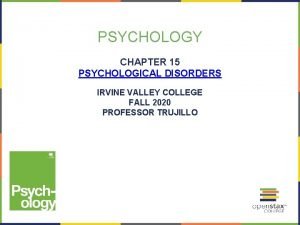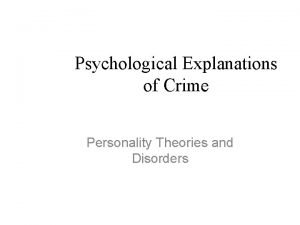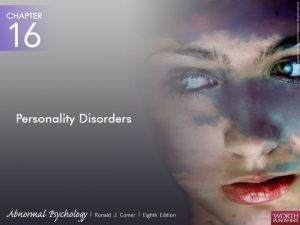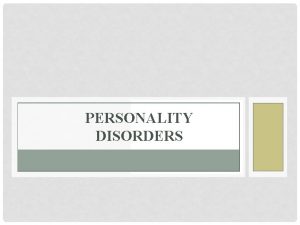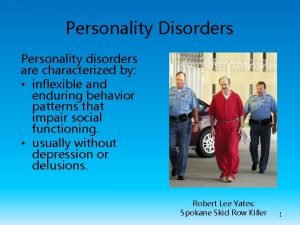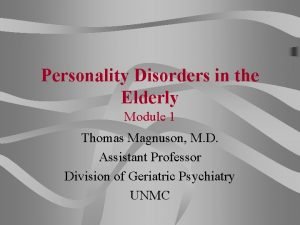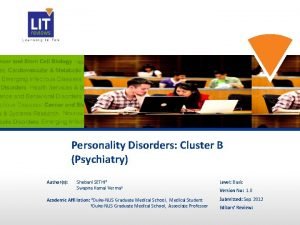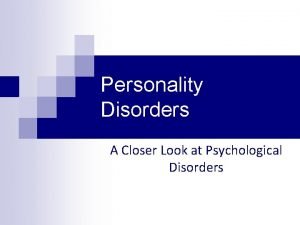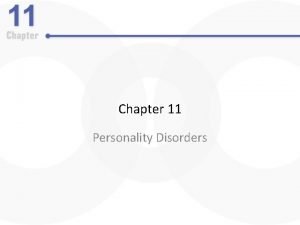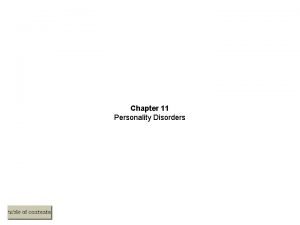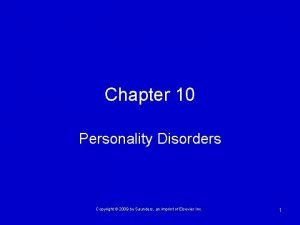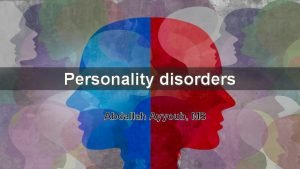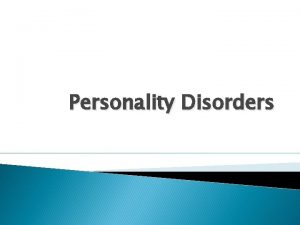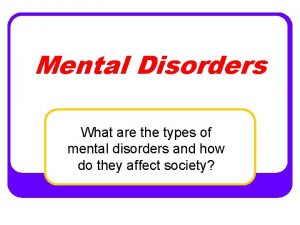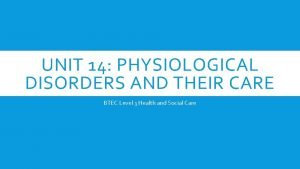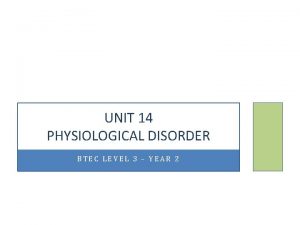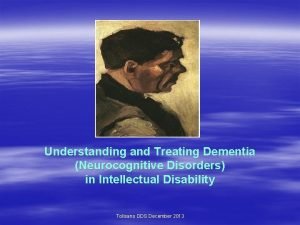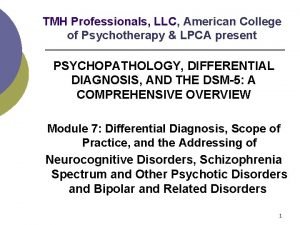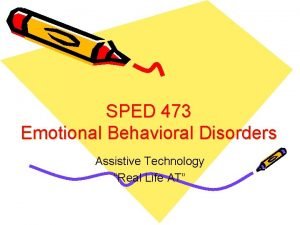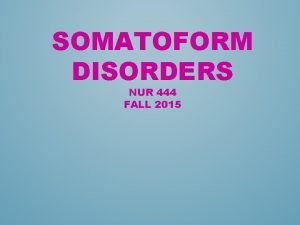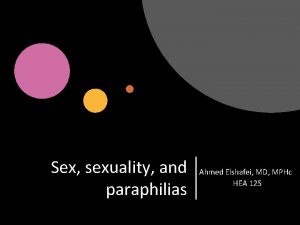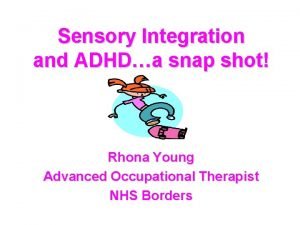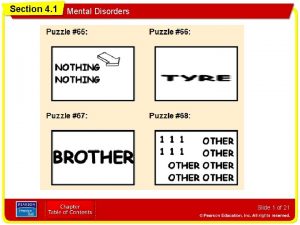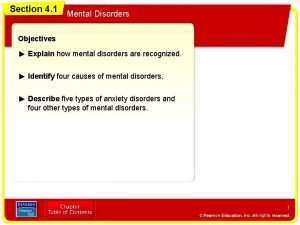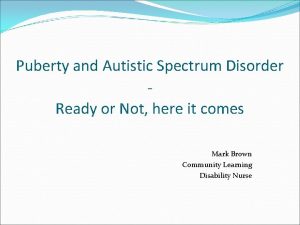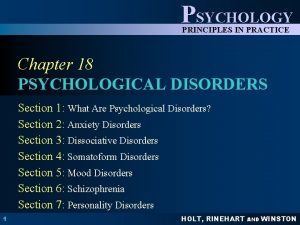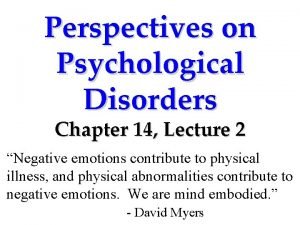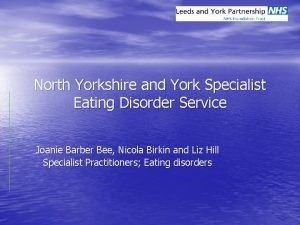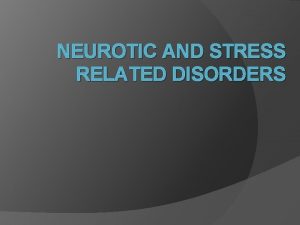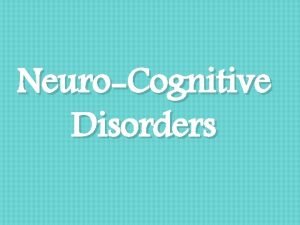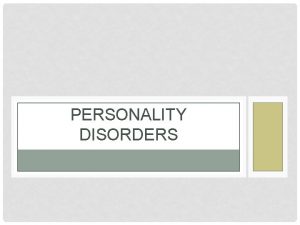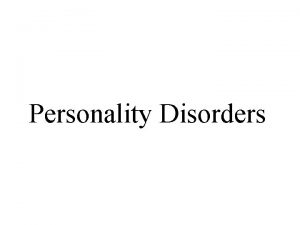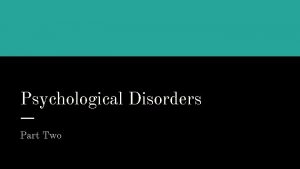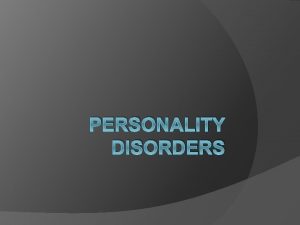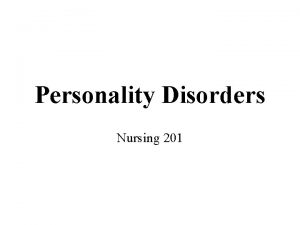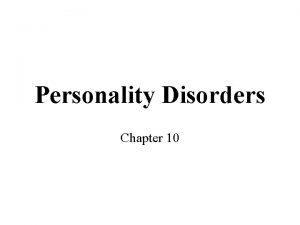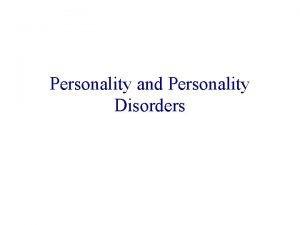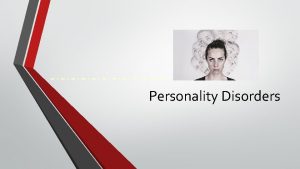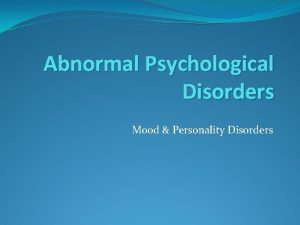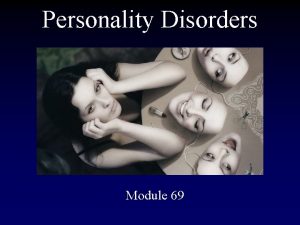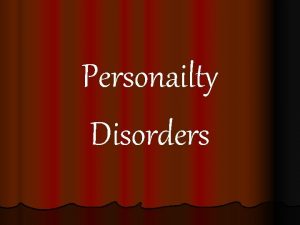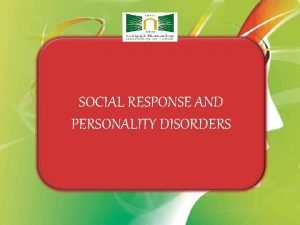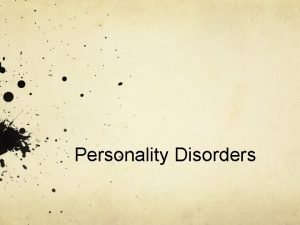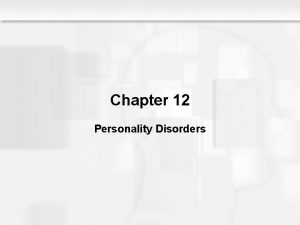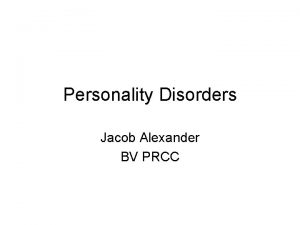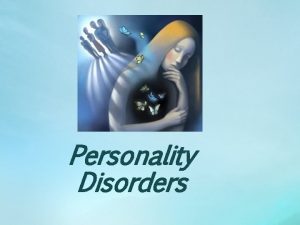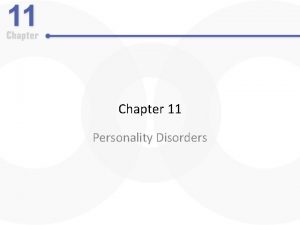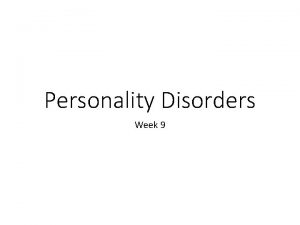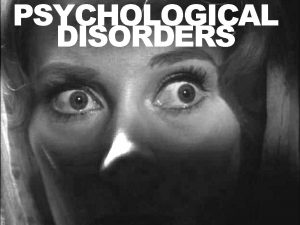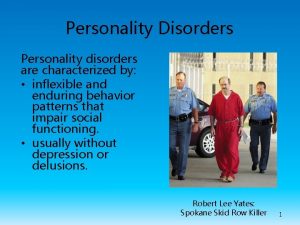Personality Disorders What is your personality Personality is

































- Slides: 33

Personality Disorders

What is your “personality”? • Personality is the combination of thoughts, emotions and behaviors that makes you unique. It's the way you view, understand relate to the outside world, as well as how you see yourself.

Formed During Childhood • Personality forms during childhood, shaped through an interaction of two factors: • Your genes. Certain personality traits may be passed on to you by your parents through inherited genes. These traits are sometimes called your temperament. • Your environment. This involves the surroundings you grew up in, events that occurred, and relationships with family members and others.

What causes a personality “disorder”? • Personality disorders are thought to be caused by a combination of these genetic and environmental influences. • Your genes may make you vulnerable to developing a personality disorder, and a life situation may trigger the actual development.

So just what is a Personality Disorder? • A personality disorder (PD) is a type of mental disorder in which you have a rigid and unhealthy pattern of thinking, functioning and behaving.

• A person with a personality disorder has trouble perceiving and relating to situations and to people. This causes significant problems and limitations. • Even though they don’t see it, their behavior often interferes with their ability to socially adapt and get along well with others.

• A personality disorder (PD) is troublesome to other people who have to come in to contact with the person who has the PD. • Some estimates suggest that up to 26 million people in the US, or 9% of the population, may have PDs (most are undiagnosed).

• Many people with PDs don’t realize they have one because their way of thinking and behaving seems natural to them. • Even though most people around them would say that their behavior is dysfunctional, people with PDs believe their own behaviors are reasonable responses to the way the world is treating them.

Don’t usually seek out treatment • Therefore, most people with PDs will not seek out help on their own because they don’t see anything wrong with their and as a result see no need behavior to change.

• People with PDs will usually deny that a problem exists“everyone can see it but them. ” • And they may blame others for the challenges they face. • If they are confronted they are likely to say you have the problem.

• Unlike other disorders such as anxiety of depression, people with PDs don’t necessarily see their life being negatively affected by it (even though it is) and therefore don’t want help.

Who is at risk of developing a PD? • Although the precise cause of personality disorders isn't known, certain factors seem to increase the risk of developing or triggering personality disorders, including: • Family history of personality disorders or other mental illness • Low level of education and lower social and economic status • Verbal, physical or sexual abuse during childhood • Neglect or an unstable or chaotic family life during childhood • Being diagnosed with childhood conduct disorder • Variations in brain chemistry and structure

When do they begin? • Personality disorders usually begin in the teenage years or early adulthood.

What negative effects can a PD have? • Personality disorders can significantly disrupt the lives of both the affected person and those who care about that person. Personality disorders may cause problems with relationships, work or school, and can lead to social isolation or alcohol or substance abuse.

Treatment • Unlike depression or anxiety disorders, which can be treated with drugs or therapy, treating a PD involves changing a person’s “whole being, ” and not just one symptom or behavior and therefore PDs are not easily changed.

• Because personality disorders are long-standing, treatment may require months or years. • Talk therapy may be beneficial if the person is willing to admit that they have a personality disorder.

Many Different Kinds • There are 10 different types of personality disorders which are broken into 3 categories, or clusters, based on similar symptoms and characteristics • Many people with one personality disorder also have signs and symptoms of at least one additional personality disorder.

10 Categories Of Personality Disorders

Cluster A Personality Disorders Odd, Eccentric, Thinking and Behavior • Paranoid Personality Disorder • Schizotypal Personality Disorder

Paranoid Personality Disorder • Extreme distrust of others, always suspicious of people’s motives, questions loyalty of friends and associates, may accuse partner of cheating, perceives innocent remarks as personal insults or attacks that aren’t real (and has angry or hostile response to these perceived attacks), tendency to hold grudges.

Schizoid Personality Disorder • Not schizophrenia though some of the same symptoms • Shows very limited range of emotional expression, praise or criticism from others seems to make no difference, uncomfortable around others because they can’t relate to them, difficulty forming relationships, would rather be alone, appearance of being cold or indifferent to others

Schizotypal Personality Disorder • Again, not schizophrenia, but has many of the same symptoms. • Odd, peculiar, or weird behavior, dress, or speech, Strange beliefs or delusions, "Magical thinking" believing you can influence people and events with your thoughts, emotions that are inappropriate for the situation (like laughing at a funeral), belief that certain casual incidents or events have hidden messages meant specifically for you (ideas of reference)

Cluster B Personality Disorders Dramatic, Overly emotional or unpredictable Thinking and Behavior • Antisocial Personality Disorder • Borderline Personality Disorder • Histrionic Personality Disorder • Narcissistic Personality Disorder

Antisocial Personality Disorder • Also called “sociopathic” or a “psychopath” • Predominantly males • Total disregard for the rules of society, frequently involved with the criminal justice system, manipulative to get what they want at any cost, violates others’ rights, frequent lying, stealing, or using aliases, impulsive behavior, aggressive, often violent behavior, self-centered, lack of concern for safety of self or others, doesn’t care about others feelings, shows no remorse for actions

Serial Killers • Most serial killers have antisocial personality disorder • However, most people with antisocial personality disorder are not serial killers • In fact, many people with this personality disorder are very successful leaders and/or businessmen (a scary thought!)

Borderline Personality Disorder • More women than men • Very emotional, unstable or fragile self-image, extreme mood swings (often in reaction to stress), unstable and intense relationships, intense anger or difficulty controlling it, impulsive and risky behavior such as having unsafe sex, gambling, or binge eating, may engage in self-destructive behaviors like substance abuse or even self-harm (cutting), intense fear of being alone or abandoned, ongoing feelings of emptiness • High risk for attempted suicide.

Histrionic Personality Disorder • Extremely dramatic (“drama queen”), express extreme emotions that are usually fake and only to get a response, constantly seeking attention, they feel uncomfortable when not the center of attention, strong opinions, but few facts or details to back them up, excessive concern with physical appearance, thinks relationships with others are closer than they really are, makes a big deal out of everything (“you’re not going to believe what happened to me…”)

Narcissistic Personality Disorder • Feelings of superiority and being “special”, Often feel that others don’t recognize your greatness or give you the recognition and treatment that you deserve, Expectation of constant praise and admiration, Sense of entitlement and being more important than others, Preoccupied with fantasies of unlimited success, beauty & brilliance, Failure to recognize others’ needs and feelings, Arrogance, Unreasonable expectations of favors and advantages, often taking advantage of others, belief that others envy you, Exaggeration of achievements or talents

Cluster C Personality Disorders Fearful or Anxious Thinking & Behaviors • Dependent Personality Disorder • Avoidant Personality Disorder • Obsessive Compulsive Personality Disorder

Dependent Personality Disorder • Clingy behavior, feel helpless when alone, needs to be taken care of, can’t make a decision on their own, needs constant reassurance and approval, will do whatever others want to avoid abandonment, Lack of self-confidence, require excessive advice from others to make even small decisions, difficulty disagreeing with others due to fear of disapproval, Tolerance of poor or abusive treatment, even when other options are available, need to start a new relationship when a close one has ended

Avoidant Personality Disorder • Feels inadequate, inferior, or unattractive, extremely sensitive to what others think and say about them (interpreting any comment as an insult or criticism even when it is not), usually avoid social situations or getting involved with others unless certain of being liked, avoid new activities or meeting strangers, belief that you are unappealing to others (why would they like me? ), extreme shyness, Fear of embarrassment or ridicule

Obsessive Compulsive Disorder Personality • Not to be confused with OCD. • Very rigid and inflexible, anal retentive, Extreme perfectionism, resulting in dysfunction and distress when perfection is not achieved, everything has to be orderly and “just right, ” lives by “the rules”, will focus on lists, schedules, and details, yet miss the big picture, Desire to be in control of people, tasks and situations, narrow minded and inflexible thinking, will excessively work and be so preoccupied with being productive that will allow no time for fun or just relaxing, Inflexible about morality, ethics or values, Tight, miserly control over budgeting and spending money

Sources • Mayo. Clinic. org
 What are the 10 personality disorders
What are the 10 personality disorders Cluster b personality disorder
Cluster b personality disorder Avoidant personality traits
Avoidant personality traits Dsm v personality disorders
Dsm v personality disorders Psychological disorders characterized by inflexible
Psychological disorders characterized by inflexible Cluster c
Cluster c Cluster traits
Cluster traits Paranoid personality disorder
Paranoid personality disorder Karla homulka
Karla homulka Cluster c
Cluster c What is sadistic personality disorder
What is sadistic personality disorder Cluster b personality disorders
Cluster b personality disorders Weird wild wacky personality disorders
Weird wild wacky personality disorders Cluster c personality disorders
Cluster c personality disorders Personality disorder types
Personality disorder types Give us your hungry your tired your poor
Give us your hungry your tired your poor Unit 14 physiological disorders
Unit 14 physiological disorders Unit 14 health and social care level 3
Unit 14 health and social care level 3 Neurocognitive disorders
Neurocognitive disorders Bipolar and other related disorders
Bipolar and other related disorders Bipolar and other related disorders
Bipolar and other related disorders Flinders model of chronic care self-management limitations
Flinders model of chronic care self-management limitations Assistive technology for emotional disturbance
Assistive technology for emotional disturbance Nursing care plan for somatoform disorder
Nursing care plan for somatoform disorder Paraphilia disorders
Paraphilia disorders Types of sensory disorders
Types of sensory disorders Section 4-1 mental disorders answers
Section 4-1 mental disorders answers Section 4-1 mental disorders answers
Section 4-1 mental disorders answers Puberty and autism spectrum disorders
Puberty and autism spectrum disorders Medical model psychology
Medical model psychology Axis 1 and axis 2 disorders
Axis 1 and axis 2 disorders Yorkshire centre for eating disorders
Yorkshire centre for eating disorders Neurotic, stress-related and somatoform disorders
Neurotic, stress-related and somatoform disorders Remiryl
Remiryl
